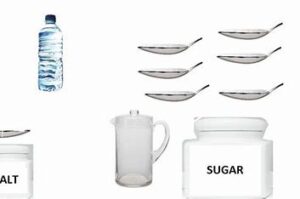
To control diarrhea causes, maintain hydration, avoid trigger foods, and consider remedies like probiotics and over-the-counter medications.
What is diarrhea?

Diarrhea is a common health issue marked by the repeated expulsion of loose, liquid, or unformed feces.
It occurs when the digestive system is unable to properly absorb water or when it secretes excess fluids into the intestines, leading to an increase in the volume and frequency of bowel movements.
Diarrhea can be acute, lasting for a short duration, or chronic, lasting for weeks or even months.
What is acute diarrhea?
Acute diarrhea refers to a sudden onset of diarrhea that lasts for a short duration, usually less than two weeks. It is a common condition that affects people of all ages and can be caused by various factors.
Here is some detailed information about diarrhea:
Causes of acute diarrhea:
Acute diarrhea can be caused by several factors, including viral, bacterial, or parasitic infections.
Common viral causes include rotavirus, norovirus, and adenovirus. Bacterial causes may include Escherichia coli (E. coli), Salmonella, Shigella, and Campylobacter. Parasitic causes can include Giardia and
Cryptosporidium. Additionally, certain medications, food intolerances, and underlying medical conditions can also lead to diarrhea.
Symptoms of acute diarrhea:
The main symptom of diarrhea is the passage of loose, watery stools. Other symptoms may include abdominal pain or cramps, bloating, nausea, vomiting, fever, and dehydration.
In severe cases, blood or mucus may be present in the stool.
Treatment of acute diarrhea:
Treatment for acute diarrhea aims to alleviate symptoms, prevent dehydration, and address the underlying cause if necessary.
It often involves rest, fluid replacement to prevent dehydration (such as oral rehydration solutions), and a bland diet.
In some cases, medications may be prescribed to manage specific causes or symptoms.
Prevention:
Practicing good hygiene, such as washing your hands regularly, can help prevent the spread of infections caused by diarrhea.
Proper food handling, including thorough cooking and avoiding contaminated food or water, is also important.
Vaccines, such as the rotavirus vaccine for infants, can provide protection against certain viral causes of diarrhea.
It is worth noting that this information is a general overview, and it is advisable to consult a healthcare professional for proper diagnosis and personalized advice based on your specific situation.
What is Chronic diarrhea?
Chronic diarrhea refers to a condition where loose, watery stools persist for a long period of time, usually lasting more than four weeks.
It is important to note that chronic diarrhea is not a disease itself, but rather a symptom of an underlying health issue.
It is important to note that chronic diarrhea is not a disease in itself, but rather a symptom of an underlying health problem.
Here is a detailed overview of diarrhoea:
Common causes of diarrhea include:
Infections:
Bacterial, viral, or parasitic infections, often resulting from contaminated food or water, are a leading cause of acute diarrhea.
Common pathogens include E. coli, Salmonella, norovirus, and Giardia.
Food intolerances:
Some people may have difficulty digesting certain foods, such as lactose (found in dairy products) or gluten (found in wheat, barley, and rye), causing diarrhea when they eat these items.
Medications:
Some medications, such as antibiotics, can disrupt the balance of beneficial bacteria in the gut, causing diarrhea as a side effect.
Gastrointestinal disorders:
Chronic conditions like irritable bowel syndrome (IBS), inflammatory bowel disease (IBD), and celiac disease can cause chronic diarrhea.
Food poisoning: Consumption of contaminated or spoiled food can lead to food poisoning, which often results in diarrhea as one of its symptoms.
Stress and anxiety:
Emotional factors can sometimes trigger diarrhea or exacerbate existing gastrointestinal conditions.
The treatment for diarrhea depends on its cause and duration.
In many cases, acute diarrhea resolves on its own and can be managed with rest, increased fluid intake to prevent dehydration, and dietary adjustments.
In cases of chronic or severe diarrhea, it’s important to consult a healthcare professional for a proper diagnosis and treatment plan.
Treatment may include medications, dietary modifications, or addressing the underlying medical condition.
What are the causes of diarrhea and what remedies are mentioned in this article to control it?
Diarrhea can have various causes, and it often results from the body’s response to an underlying issue.
Here are some common causes of diarrhea:
Infections:
Bacterial infections:
Pathogenic bacteria like Escherichia coli (E. coli), Salmonella, Shigella, and Campylobacter can cause diarrhea when ingested through contaminated food or water.
Viral infections:
Viruses like norovirus, rotavirus, and enteric viruses can lead to viral gastroenteritis, resulting in diarrhea.
Parasitic infections:
Protozoa such as Giardia and Cryptosporidium can cause diarrhea when transmitted through contaminated water or food.
Food Poisoning:
Consuming food contaminated with harmful bacteria, toxins, or other pathogens can lead to food poisoning, which often includes diarrhea as a symptom.
Food Intolerances:
Lactose intolerance:
The inability to digest lactose, a sugar found in milk and dairy products, can cause diarrhea and other gastrointestinal symptoms in affected individuals.
Fructose intolerance:
Some people may have difficulty absorbing fructose, a natural sugar found in fruits, honey, and certain sweeteners, leading to diarrhea.
Medications:
Some medications, especially antibiotics, can disrupt the balance of beneficial bacteria in the gut, causing antibiotic-associated diarrhea.
Gastrointestinal Disorders:
Inflammatory bowel disease (IBD): Conditions like Crohn’s disease and ulcerative colitis can lead to chronic diarrhea.
Irritable bowel syndrome (IBS): IBS can cause recurrent diarrhea, often associated with abdominal pain and changes in bowel habits.
Celiac disease:
An autoimmune disorder triggered by gluten consumption, which can result in diarrhea and other digestive symptoms.
Traveler’s Diarrhea:
Traveling to regions with different sanitation standards and consuming contaminated food or water can lead to traveler’s diarrhea.
Stress and Anxiety:
Emotional stress and anxiety can sometimes trigger or worsen diarrhea in susceptible individuals due to the gut-brain connection.
Dietary Factors:
Overconsumption of certain foods or drinks, high-fiber foods, or spicy foods can irritate the gastrointestinal tract and lead to diarrhea.
Poor sanitation(environmental health):

Poor sanitation can contribute to the spread of diarrhoeal diseases.
Limited availability of clean drinking water, lack of proper sanitation practices, and dirty environments can increase the chances of diarrhea spreading.
Polluted water supplies, inadequate disposal of human waste, unhygienic food handling practices can introduce germs that lead to diarrhea.
Good sanitation and home remedies can control diarrhea and its causes.
For example, if water sources are contaminated with fecal matter containing bacteria, viruses, or parasites, consuming or using that water can lead to diarrhoeal infections.
Similarly, if proper handwashing practices are not followed after using the toilet or before handling food, it can facilitate the transmission of diarrhoeal pathogens.
Improving sanitation infrastructure, promoting access to clean water, and educating communities about proper hygiene practices are crucial in reducing the incidence of diarrhoeal diseases.
Underlying Medical Conditions:
Certain medical conditions like diabetes, hyperthyroidism, and chronic pancreatitis can cause chronic diarrhea.
Surgery or Medical Procedures:
After certain surgeries or medical procedures involving the gastrointestinal tract, individuals may experience diarrhea as a side effect.
It’s important to note that the treatment for diarrhea depends on its underlying cause.
Acute diarrhea often resolves on its own with supportive care, while chronic or severe diarrhea may require medical evaluation and treatment tailored to the specific cause.
Dehydration is a potential complication of diarrhea, so maintaining adequate fluid intake is crucial, especially in cases of prolonged or severe diarrhea.
If you experience persistent or severe diarrhea, it’s advisable to consult a healthcare professional for proper evaluation and management.
What are the symptoms of diarrhea?
Diarrhea is typically characterized by the following symptoms:
Frequent Bowel Movements:
Diarrhea involves the passage of loose, watery, or unformed stools more frequently than normal.
The number of bowel movements can vary from person to person.
Watery Stools:
The stools in diarrhea are often watery and lack the usual consistency of formed stools.
The consistency can range from slightly loose to entirely liquid.
Urgency:
People with diarrhea may feel a strong and sudden urge to have a bowel movement, often making it difficult to reach a toilet in time.
Abdominal Discomfort:
Many individuals with diarrhea experience cramping, abdominal pain, or discomfort in the lower abdomen. These symptoms may be mild to severe.
Bloating and Gas:

Some people with diarrhea may also have increased gas production and abdominal bloating.
Nausea and Vomiting:
Nausea and vomiting can accompany diarrhea, especially in cases of gastrointestinal infections or food poisoning.
Fever:
Infections that cause diarrhea, such as viral or bacterial gastroenteritis, may be associated with fever in addition to gastrointestinal symptoms.
Dehydration:
Diarrhea can lead to fluid loss, and if not managed properly, it can result in dehydration.
Signs of dehydration may include increased thirst, dry mouth, dark urine, fatigue, and lightheadedness.
Blood or Mucus:
In some cases, diarrhea may contain blood or mucus, which can indicate an underlying medical condition that requires attention.
Other Symptoms:
Depending on the underlying cause, diarrhea may be accompanied by additional symptoms such as weight loss, joint pain, or skin rashes in certain medical conditions.
It’s important to note that the severity and duration of diarrhea can vary widely depending on its underlying cause.
Acute diarrhea, often caused by infections or dietary factors, typically resolves within a few days with proper hydration and rest.
Chronic diarrhea, which lasts for several weeks or more, may be indicative of an underlying medical condition and should be evaluated by a healthcare provider.
If you or someone you know experiences severe or persistent diarrhea, especially if it is accompanied by signs of dehydration, it’s important to seek medical attention promptly to prevent complications.
What are the home remedies for diarrhea to control its causes?
Home remedies can be effective in managing mild cases of diarrhea and helping alleviate symptoms. Here are some home remedies to consider:
1. Stay Hydrated:
The most important aspect of managing diarrhea is staying well-hydrated to prevent dehydration.
Drink clear fluids regularly, such as water, clear broths, herbal teas, or diluted fruit juices (without added sugar).
Oral rehydration solutions (ORS), available at most pharmacies, are specifically designed to replace lost fluids and electrolytes.
Well-hydrated and home remedies can control diarrhea and its causes.
2. Eat soft, Easily Digestible Foods:
The BRAT diet:
BRAT stands for bananas, rice, applesauce, and toast.
These foods are considered soft and may help firm up stools and provide gentle nourishment.
However, it’s important to note that the BRAT diet alone may not provide all the necessary nutrients, so it should be used temporarily and in combination with other easily digestible foods.
Plain rice, plain pasta, plain crackers, and plain boiled potatoes are also easy on the stomach.
3. Probiotics:
Probiotic-rich foods like yogurt with active cultures can help restore the balance of beneficial bacteria in the gut, which may aid in recovery from diarrhea.
Look for yogurt containing live and active cultures.
4. Ginger:

Ginger has natural anti-inflammatory and anti-nausea properties and may help soothe the digestive system.
You can make ginger tea by steeping fresh ginger slices in hot water or chewing on small pieces of fresh ginger.
Ginger tea is one of the home remedies that can control diarrhea and its causes.
5. Apple Cider Vinegar:

Some people find relief from diarrhea by mixing a teaspoon of apple cider vinegar with a glass of water and sipping it slowly.
Be cautious with this remedy if you have a sensitive stomach.
6. Chamomile Tea:

Chamomile tea can have a calming effect on the digestive system and may help reduce diarrhea-related discomfort.
7. Avoid Irritating Foods:
Stay away from spicy, greasy, or fatty foods, as well as dairy products if you suspect lactose intolerance. These can worsen diarrhea.
8. Rest:
Resting and allowing your body to recover is essential, especially if you’re feeling weak or fatigued due to diarrhea.
9. Maintain Good Hygiene:
Practice good hand hygiene to prevent the spread of infection.
Wash your hands thoroughly with soap and water after using the bathroom and before eating or preparing food.
10. Avoid Over-the-Counter Anti-Diarrheal Medications:
While over-the-counter medications like loperamide (Imodium) can be effective for short-term relief, they are not recommended for everyone and may not be suitable for all types of diarrhea.
Consult with a healthcare professional before using these medications, especially for children or if you have certain medical conditions.
11. Oral Rehydration Solutions (ORS):

ORS solutions are specially formulated to replace lost fluids and electrolytes.
They can be particularly helpful for preventing or treating dehydration, especially in cases of severe diarrhea.
You can purchase ORS solutions at most pharmacies or make a homemade version by mixing 1 liter of clean water with 6 teaspoons of sugar and 1/2 teaspoon of salt.
12. Avoid certain substances:
Limit or avoid caffeine, alcohol, and dairy products until your digestive system has fully recovered, as they can worsen diarrhea symptoms.
It’s important to remember that these home remedies are typically suitable for managing mild, short-lived cases of diarrhea.
If diarrhea is severe or prolonged, it is important to seek medical attention.
Consult a healthcare provider if it is accompanied by high fever, blood in stools, or signs of dehydration.
If the diarrhea persists for more than a couple of days, there may be an underlying medical condition that requires evaluation and treatment.







